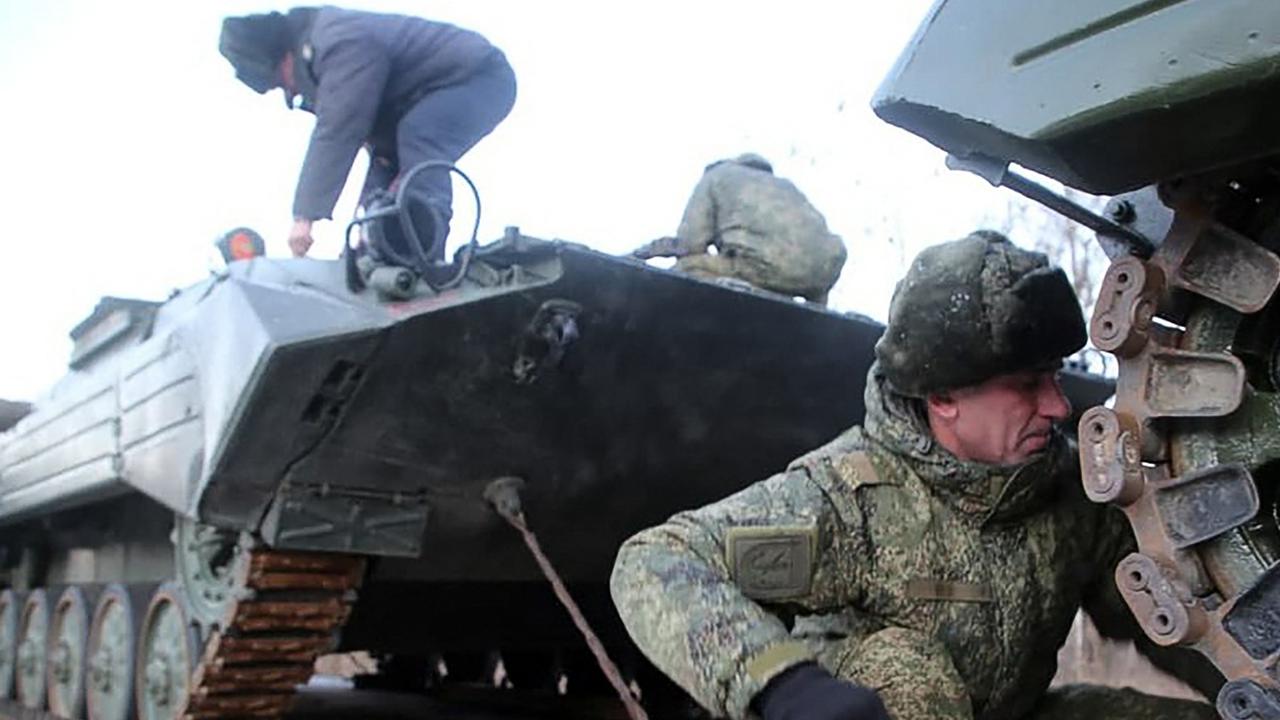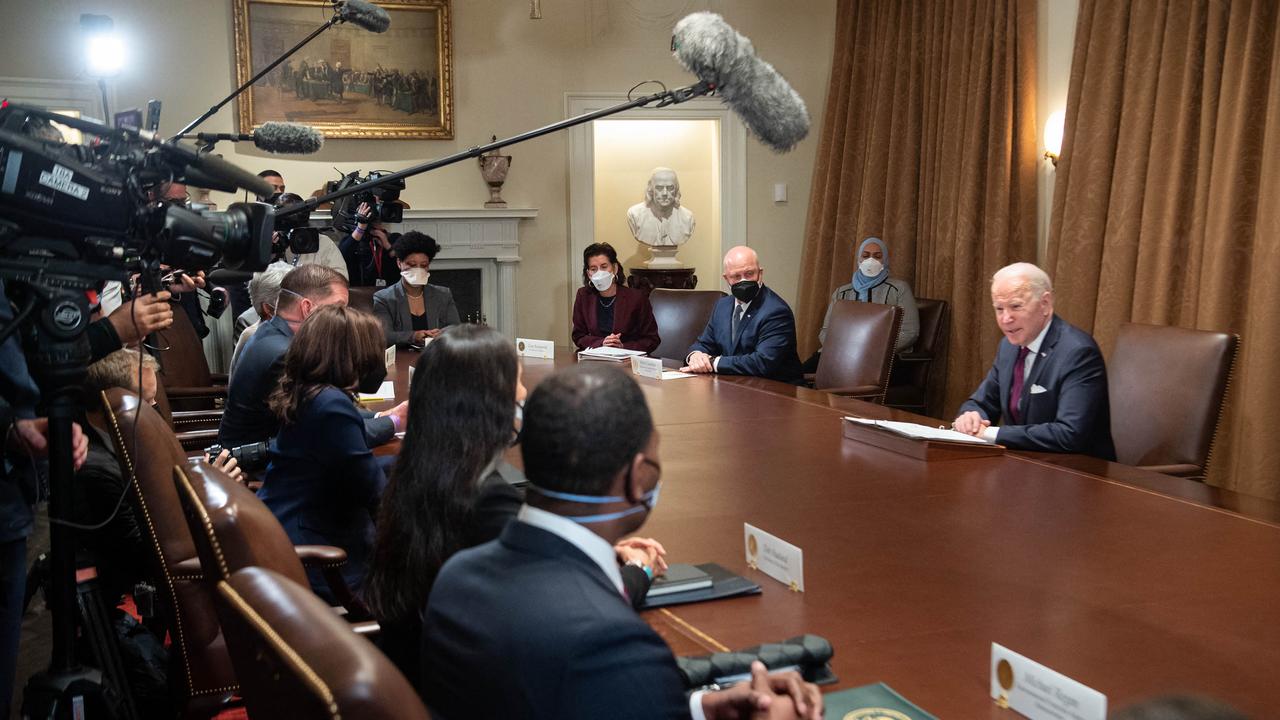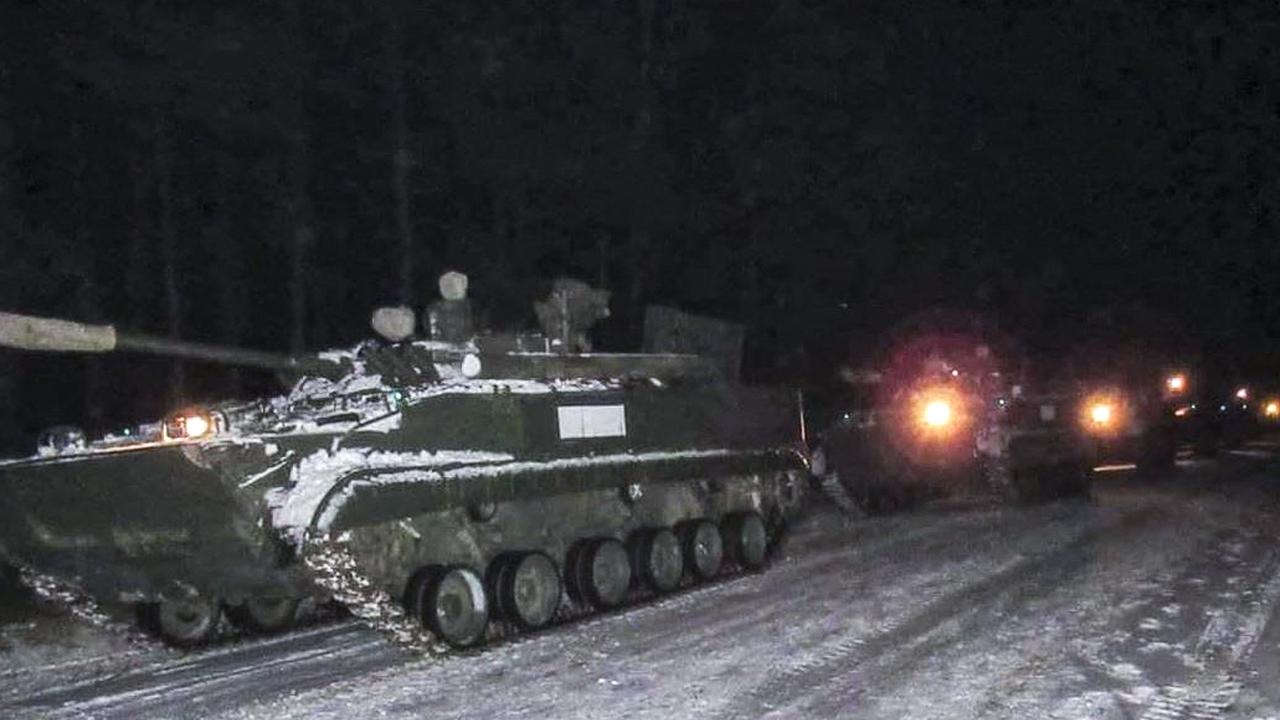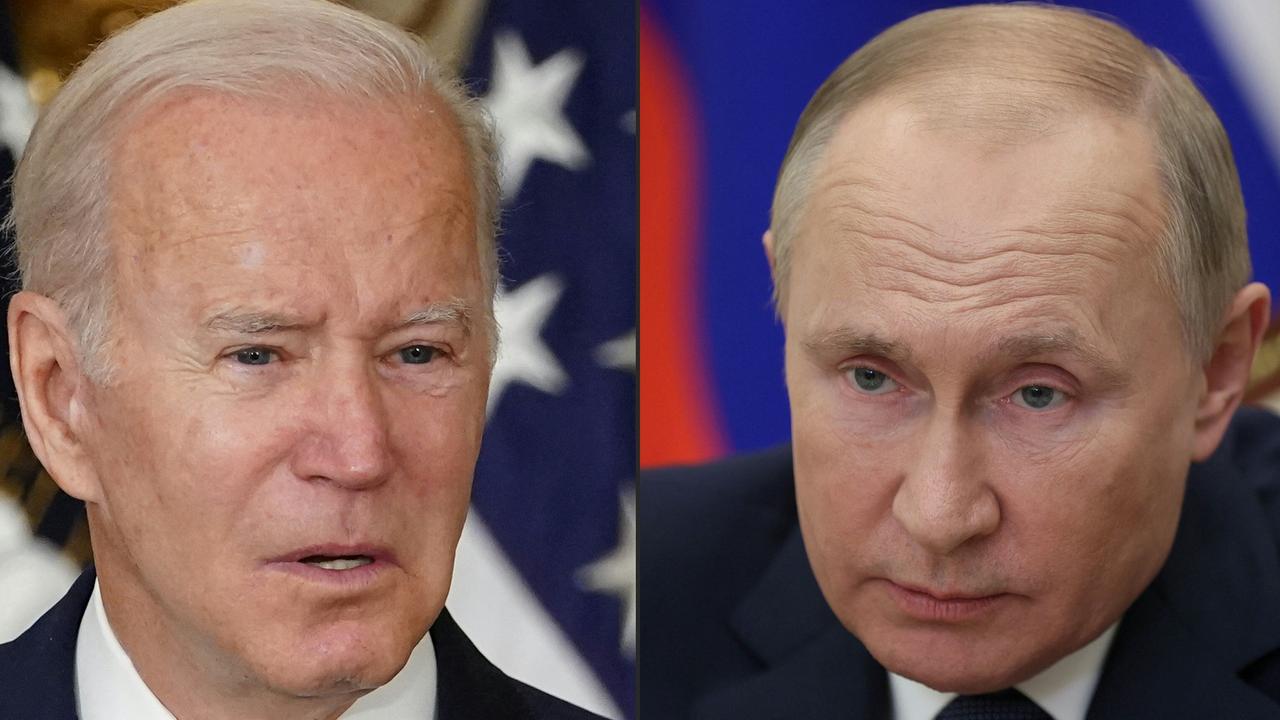US could cripple Russia’s invasion of Ukraine with sanctions
As tensions rise on the Russia-Ukraine border and 100,000 troops are massed, there’s a move that the US could take to cripple Russia.
Chips? Cash? Elite boarding schools? The United States and the European Union agree: Russian aggression against Ukraine must be punished. But they disagree on what aggression is. Or what the punishment should be.
NATO won’t send in troops. Ukraine isn’t a treaty member. And the alliance’s constitution is purely a defensive one.
Nor will US President Joe Biden directly intervene. After the embarrassments of Afghanistan and Iraq, the US simply has no appetite for a far more dramatic military intervention.
But he could reinforce any Ukrainian resistance. And he could co-ordinate immensely costly international sanctions.
Moves to prepare such responses are underway.
The Biden administration has been threatening “high impact, quick action” sanctions against the Kremlin if it invades Ukraine for months now.
Concluded a productive trip to Kyiv where I reaffirmed our unwavering support for Ukraine’s sovereignty and territorial integrity. The United States is committed to strengthening our relationship with Ukraine as we work to deter further Russian aggression. Next stop is Berlin. pic.twitter.com/TofxukbyxN
— Secretary Antony Blinken (@SecBlinken) January 20, 2022
The White House has warned the US silicon chip industry to prepare for a ban of exports to Russia. And that may soon extend to all electronics supplies.
Then there’s Moscow’s access to international currency exchanges. And the prestige its kleptocrats gain from sending their children to elite international schools.
But ten months of such threatening diplomacy has so far failed to disperse Moscow’s massive troop concentrations. And it remains unclear exactly what President Vladimir Putin plans to do with the 100,000 troops he has massed near Ukraine and Poland’s borders.
Stream your news live & on demand with Flash for $8/month and no lock in contracts. New to Flash? Try 14 days free now >

“The key to thwarting Russian ambitions is to prevent Moscow from having a quick victory and to raise the economic, political, and military costs by imposing economic sanctions, ensuring political isolation from the West, and raising the prospect of a prolonged insurgency that grinds away the Russian military,” argue Seth Jones, a political scientist, and Philip Wasielewski, a former CIA paramilitary officer, in a January 13 analysis for the Center for Strategic and International Studies.
But can this be done?
Getting serious about sanctions
“If they actually do what they’re capable of doing with the forces amassed on the border, it is going to be a disaster for Russia if they further invade Ukraine,” President Biden warned Thursday. “If any Russian military forces move across the Ukrainian border, that’s a renewed invasion, and it will be met with a swift, severe, and united response from the United States and our Allies.”

He wasn’t able to define what that response would be.
“While it’s unclear what new sanctions the US might unleash, early reports suggest they may target Russia’s financial system, including its biggest banks and ability to convert roubles into dollars,” says University of Notre Dame director of policy studies David Cortright. “Such sanctions would be meant to punish Russia’s economy, Putin allies and the country’s wealthier residents.”
💬#Zakharova: The West does not see any inherent value in Ukraine & views it as a geopolitical bridgehead against Russia.
— MFA Russia 🇷🇺 (@mfa_russia) January 20, 2022
â˜ï¸Pro-Western Ukrainian elites provoked a civil conflict in the country & split it apart in 2013-2014 for the sake of the mythical promise of EU membership. pic.twitter.com/JNviYTa9za
But Putin may believe – based on experience – that this is a hollow threat.
“In terms of their impact on the global economy, tough financial sanctions on Russia could well be the largest use of sanctions since the United States targeted Japanese finance and oil imports before World War II,” says assistant professor Chris Miller of the American Enterprise Institute.
“This is why Russia may think the United States is bluffing when it threatens dramatic sanctions. The Kremlin believes it has a far higher tolerance for risk than its American or European counterparts.”
Russian stock markets have barely budged despite the growing array of economic threats.
“The markets’ collective shrug mirrors the Kremlin’s view that the United States will not follow through on the harsh sanctions it has discussed,” Miller says. “Russian policymakers know that many of the tactics that could seriously hurt Russia — such as curbing Russian commodity exports or black-listing Russian banks — would be costly to the West, too.”
It’s just business …
Russia is the European Union’s fifth-largest trading partner. The EU is Russia’s biggest.
The US barely registers on Russia’s accounts book.
Put simply, Moscow can merely source the stuff banned by the US elsewhere.
“Moscow’s extensive commercial ties with states in the EU would allow it to mitigate the impacts of sanctions that do not have full European support and co-operation,” Cortright argues. “Russia supplies Europe with much of its natural gas, assuring access to trade and revenues regardless of US measures.”
Recent sanctions efforts have not been successful.
They’ve been imposed in retaliation for global cyber attacks, the military seizure of the Crimean state of Crimean and ongoing support for pro-Russian rebels in the Crimean state of Donbas.
While in Kyiv, @SecBlinken reaffirmed the United States' unwavering support for Ukraine “at a time when its security, its prosperity, its democracy, its fundamental right to exist as a sovereign, independent nation are facing an unprecedented challenge from Russia.†pic.twitter.com/FwX4flKbTB
— Department of State (@StateDept) January 20, 2022
But the West has rarely had a unified response. And such divisions have again emerged in talks among European Union and NATO states.
“Germany and France are resisting a European Union effort to specify which sanctions they’d impose if Putin, in fact, invades Ukraine,” Miller says.
And that’s what President Putin expected.
Russia’s foreign minister, Sergey Lavrov, has called the idea of withdrawing troops from the Ukraine border “absurd”.

“Russian leaders certainly perceive Biden as weak, distracted by America’s internal political schisms and the need to outline a coherent approach to its competition with China,” says Australian National University defence studies fellow Matthew Sussex. “Second, Russia’s brinkmanship also helps reveal potential fault lines among NATO members. This is intended to wheedle out those who are more risk-averse, like Germany, from those such as Poland who see Russia as a clear threat to their territorial integrity.”
Divided we fall …
“He’s never seen sanctions like the ones I promised will be imposed if he moves,” President Biden warned recently. That includes severing Moscow from all US financial institutions and “anything that involves dollar denominations.”
White House officials have suggested isolating Moscow from the Society for Worldwide Interbank Financial Telecommunication (SWIFT). Such a move would severely affect its ability to trade in international currencies.
But it needs European Union Support. And that’s yet to emerge.
But, as the attempts to appease Adolf Hitler in the 1930s show, doing nothing comes with its own cost. Moscow may interpret that as tacit approval to seize other former Soviet Union states – such as Latvia, Lithuania and Estonia. And it’s always coveted the access to the Baltic Sea offered by Finland and Sweden.
💬#Zakharova: Russia will not stand by idly if the #EU continues pandering to the East European and Baltic countries by proceeding in its foreign policy and military planning from the mythical “Russian threat†and matching it with the corresponding capabilitiesâ˜ï¸ pic.twitter.com/4Jzzz6RQqN
— MFA Russia 🇷🇺 (@mfa_russia) January 20, 2022
But Latvia, Lithuania and Estonia felt compelled to join NATO because of Russia’s coercive tactics. Sweden and Finland are nurturing stronger ties, though they are yet to sign on the dotted line.
The rest of Europe, however, is does not feel as threatened.
“It’s very important that we keep everyone in NATO on the same page,” President Biden said Thursday. “That’s what I’m spending a lot of time doing, and there are differences. There are differences in NATO as to what countries are willing to do, depending on what happens.”

That candid admission was music to Putin’s ears. It left Ukrainian officials aghast.
It’s precisely the kind of division Moscow is expert at exploiting.
An anonymous White House official later told US reporters that NATO members did not have the “same list” of sanctions targets. But insisted any response would remain “highly unified” and “provide a force multiplier to actions we take.”
Market forces unleashed
Russia seized Crimea and occupied part of Ukraine’s Donbas region in 2014. The US and Europe retaliated by imposing sanctions on selected Russian firms.
The International Monetary Fund (IMF) estimates this cut some 1.5 per cent out of Russia’s annual GDP.
“The Kremlin concluded this was a fair price to pay for Crimea and the Donbas and has no plans to give either territory back, no matter how long these sanctions remain in place,” Miller says. “If the Kremlin thought one per cent of its own GDP was a fair price for Crimea and the Donbas, it would surely be willing to pay more to acquire the rest of the country.”
There are other sanctions weapons in Washington’s arsenal. Such as black-listing Moscow’s banks.
Russia threatens Ukraine not only militarily, but also internally and economically. We are working to ensure Ukraine’s financial and economic stability despite challenges. Grateful to the U.S. for being ready to support Ukraine in dealing with economic challenges posed by Russia.
— Dmytro Kuleba (@DmytroKuleba) January 19, 2022
“There’s no doubt the United States could obliterate Russia’s connections with the global financial system: US officials have discussed black-listing major Russian banks, preventing banks from converting roubles into dollars, and disconnecting Russia from the SWIFT interbank communication network. But implementing any of these measures would be costly to allies in Europe. It would also directly affect China, the largest consumer of Russian commodities.”
If Beijing chooses to oppose Washington’s directives – as it has indicated it will – it could result in a global trade war.
It’s a similar problem if the US severs its supply of semiconductors, smartphones and other advanced technology.
“Smartphones are mostly produced in China, for example, so any export controls on smartphone components would work only if China were willing to enforce them. Beijing could buck US sanctions and dare Washington to retaliate — which would open a second front in a great-power financial war.”
Alternate actions
President Biden promised that acts of Russian aggression would be met “with a decisive, reciprocal, and united response”.
It doesn’t have to be monetary. It could be a price in blood.
Retired NATO commander in Europe General Philip Breedlove says the US has no compulsion to send troops into Ukraine. Instead, Washington and NATO should help Ukraine defend itself.
“Those are things we should be considering as an alliance and as a nation,” he said. “If Mr Putin is allowed to invade Ukraine and there were to be little or no consequence, we will see more of the same.”
Such support is emerging.
The UK and US have this week been rushing hundreds of thousands of Javelin antitank missiles to Ukraine. Anti-aircraft missiles are also among the mix.
On Thursday, Washington declared it would give Kiev another $US200 million in military aid. That’s on top of the $US2.5 billion supplied since Russia seized the Ukrainian state of Crimea in 2014.
President Biden is aware of the option.
“The cost of going into Ukraine in terms of physical loss of life for the Russians – they’ll be able to prevail over time, but it’s going to be heavy,” he told media on Thursday. “It’s going to be real. It’s going to be consequential. Putin has a stark choice. Either de-escalation or diplomacy. Confrontation and consequences.”
Fight or flight response
“The Western allies are sending dangerously contradictory messages about their willingness to impose anything beyond a financial slap on the wrist,” warns Miller.
He says that repeated targeted sanctions against Russia’s powerful oligarchs won’t cut it. “Russia’s business elite would prefer to continue travelling to the West and keep their foreign bank accounts. But they don’t decide Russia’s foreign policy: Putin does, with advice from a small circle of security service chiefs, most of whom are already under sanction.”
Cortright argues big-stick sanctions may not be the answer. But perhaps the carrot of lifting them may be.
“The offer to lift sanctions can be an effective bargaining chip for persuading the targeted regime to alter its policies.,” he says. “In an increasingly globalised world economy, unilateral sanctions face huge obstacles – even when imposed by the world’s largest economy.”
Whatever the case, President Biden’s sanctions threat isn’t likely to have much effect without international support.
Great to speak with my Australian counterpart @MarisePayne today on a wide range of bilateral anf international topics, including joint deterrence of further Russian aggression and strengthening Ukraine’s cyber defenses. We also discussed ways to boost trade and investment.
— Dmytro Kuleba (@DmytroKuleba) January 19, 2022
“This is not all just a cakewalk for Russia,” President Biden said. “They’ll pay a stiff price immediately, near term, medium-term and long term if they do it.”
The problem is: how?
“If Biden is serious about using sanctions to shape Russia’s calculus, his administration needs to sharpen its messaging,” says Miller. “The administration should name the Russian banks it would blacklist, the specific transactions it would prohibit, and the companies that would be in danger of going under. Then the Kremlin might start taking its sanctions threats more seriously.”
But Putin believes the dollar speaks louder than principles in Washington. Just as it does in Moscow.
“If diplomacy fails, the US and its NATO partners will need to do more than rely on cycles of sanctions and dialogue to counter Russia,” says Sussex. “More importantly, if they really do seek to uphold the principles they espouse, they may find they can speak louder with actions than with words.”
Jamie Seidel is a freelance writer | @JamieSeidel






